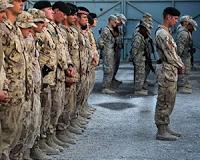| . |  |
. |
Bagram Air Base, Afghanistan (UPI) Jul 1, 2010 It may be an Apollo 13 moment in Afghanistan. After the explosive of the fuel cells, which crippled the command module, the NASA flight director, approached the problem from the standpoint of status asking the Mission Control team "what do we have on the spacecraft that's good?" Maybe the same status check should also be done for Afghanistan. No doubt encouraged by the announced timetable for the withdrawal of American forces, the United States appears to have lost a long-term commitment both of the Karzai government and Pakistan and hasn't gained the support of the dominant Pashtun tribal group. Hedging his bets, Afghan President Hamid Karzai is now negotiating with the Taliban and the Pakistan government. Pakistan, which spawned the Taliban during the bloody civil war in post-Soviet Afghanistan, continues to train and support them as a means of securing its western flank. Combined American and NATO efforts have failed to win over the Pashtuns, who comprise the vast majority of Taliban fighters. That leaves only a loose coalition of non-Pashtun tribal groups, like the Tajiks, Uzbeks, Turkmen and Hazaras, as a potential bulwark against a Taliban takeover of Afghanistan. The attempt to establish a Western-style federal government has thus far failed to take root and runs contrary to the Afghan tribal tradition of resisting central control. A confederation of tribal-based entities, which provides a more natural and historically validated balance-of-power system, seems a more likely path to success in Afghanistan. The strategic application of balance-of-power politics isn't without historical precedent. At the end of the Napoleonic Wars, the 1815 Congress of Vienna established an European-wide balance-of-power system that avoided continental war for a century. Similarly, the Cold War represented a global balance-of-power system between the democratic and communist states. Although not without its regional conflicts and tension, it did, in the end, serve mankind by preventing worldwide nuclear war. In fact, after its withdrawal from Afghanistan, Soviet leader Mikhail Gorbachev attempted to broker a regional agreement to maintain the communist-led central government by balancing power within Afghanistan and accommodating the interests of the other countries in the region. This effort failed at least in part by American diplomatic apathy and short-sightedness after our "victory" symbolized by the departure of Soviet troops. The failure of the Soviet Union and the world community to create stability in Afghanistan led to a bloody civil war and the rise of the Pakistan-sponsored Taliban. Ironically, the United States now finds itself in a similar situation with the need to move from a military to a political solution. It isn't too late for the United States to learn from its own mistakes and those of others. For example, even a Taliban-controlled Pashtun tribal region, which in itself isn't a foregone conclusion, wouldn't necessarily be strong enough to dominate Afghanistan, if effectively balanced by a confederation of non-Pashtun tribal groups and asserted efforts to prevent outside interference. It would be far easier for the United States and its allies to oppose an aggressive Taliban-dominated group than to try to defend and prop up a dysfunctional central government. In a sense, the roles would be reversed, where U.S. forces would become the insurgents disrupting attempts of any tribal or ideological entity to alter an Afghan balance-of-power system. It could provide a much-needed regional political formula whereby combat troops could be withdrawn, while at the same time supplying military guarantees against any potential aggressor either from within or outside of Afghanistan. The coming change of command is a suitable moment to rethink our current strategy and implement a more bottom-up approach in Afghanistan. It may not be the ideal or even the intended solution but it could provide a foundation for stability and avoid years of bloody stalemate. Once an appropriate level of stability is achieved, the environment would be more conducive for the Afghan people to consider the establishment of a stronger central government. (Lawrence Sellin, Ph.D., is a colonel in the U.S. Army Reserve and a veteran of the conflicts in Afghanistan and Iraq. He is currently serving his second deployment to Afghanistan. The views expressed are his own and do not necessarily reflect those of the U.S. Army or U.S. government.) (United Press International's "Outside View" commentaries are written by outside contributors who specialize in a variety of important issues. The views expressed do not necessarily reflect those of United Press International. In the interests of creating an open forum, original submissions are invited.)
Share This Article With Planet Earth
Related Links News From Across The Stans
 NATO's deadliest month in Afghan war
NATO's deadliest month in Afghan warKabul (AFP) July 1, 2010 The loss of more than 100 foreign troops in the Afghan war in June serves as a grim reminder to the international community of why Afghanistan is known as the "graveyard of empires". At 102, the June toll almost tripled the number of US and NATO soldiers killed in May, making the month the deadliest since the war began in 2001. The new commander of the Afghan war, US General David Petrae ... read more |
|
| The content herein, unless otherwise known to be public domain, are Copyright 1995-2010 - SpaceDaily. AFP and UPI Wire Stories are copyright Agence France-Presse and United Press International. ESA Portal Reports are copyright European Space Agency. All NASA sourced material is public domain. Additional copyrights may apply in whole or part to other bona fide parties. Advertising does not imply endorsement,agreement or approval of any opinions, statements or information provided by SpaceDaily on any Web page published or hosted by SpaceDaily. Privacy Statement |